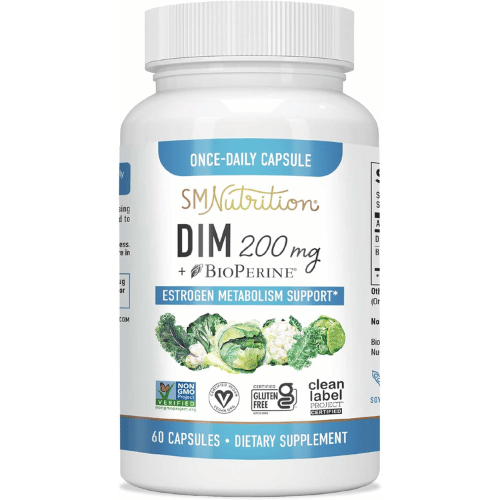Facing the unpredictability of menopause can be daunting, but understanding how to navigate the complexities of menopausal symptoms is crucial. As you seek to manage hot flashes, mood swings, and sleep issues—common hurdles for many women—you might find yourself wondering about the best supplement for menopause that fits your specific needs. This comprehensive guide dives deep into menopause supplements, evaluating their safety, side effects, and real user experiences. By focusing on evidence-based information and expert opinions, we aim to empower you with the knowledge to make informed decisions that enhance your quality of life during this significant transition.
Choosing the right menopause supplement involves more than just picking a bottle off the shelf; it requires a personalized approach informed by tests for nutrient deficiencies and hormonal imbalances. Whether you're considering natural herbs like black cohosh and wild yam, which mimic estrogen, or dietary supplements rich in Vitamin D and calcium to support bone density, the effectiveness of these solutions can vary widely. Consulting with a healthcare professional can ensure that your choice helps reduce hot flashes, improves sleep quality, and seamlessly fits your overall health strategy. Stick with us as we explore how to balance hormones naturally, the role of diet in managing menopause symptoms, and how to achieve a healthier, more comfortable menopausal phase.
Key Takeaways
- Menopause is marked by an array of physical and psychological symptoms, ranging from hot flashes, mood swings, and sleep issues to cognitive disturbances due to hormonal changes.
- While Hormone Replacement Therapy is a medically recognized treatment for menopause symptoms, supplements are a popular but less regulated alternative, and their effectiveness varies with limited scientific support for many.
- Personalizing menopause supplement plans is crucial and should be informed by tests for nutrient deficiencies, hormonal imbalances, and gut health, in conjunction with consulting healthcare professionals for safety and efficacy.
Understanding Menopause: Symptoms and Challenges

Menopause is a natural phase in a woman’s life, signifying the end of menstrual cycles. However, this biological transition is often accompanied by an array of physical symptoms, making it a challenging period for many women. Vasomotor symptoms like hot flashes and night sweats, for instance, are experienced by up to 80% of women during menopause.
In addition to these physical symptoms, menopause can also bring genitourinary issues and other menopause-related symptoms. Symptoms affecting the vaginal area, such as dryness, burning, and irritation, along with urinary frequency or urgency, can significantly impact a woman’s comfort and quality of life, making it essential to address women’s health concerns during this time.
Declining estrogen levels during menopause also lead to a drop in collagen levels, affecting skin elasticity and hair health. But the challenges of menopause aren’t just physical. Women may experience various psychological symptoms, including mood swings, irritability, anxiety, depression, and cognitive disturbances.
The onset of perimenopause, the period leading up to the final menstrual period, can last several years. This phase comes with hormone changes that affect many organ systems and can lead to symptoms such as:
- mood swings
- depression
- fatigue
- sleep issues
- brain fog
- memory loss
Hormone Replacement Therapy vs. Supplements
When it comes to managing menopausal symptoms, Hormone Replacement Therapy (HRT) and supplements are two commonly explored avenues. HRT, which is FDA-approved, is recognized as an effective treatment for menopausal symptoms such as hot flashes. However, it has drawbacks, including potential risks associated with long-term use.
In contrast, menopause supplements are often perceived as ‘safe’ and ‘natural.’ However, there is limited scientific evidence backing the efficacy of these supplements. Some studies indicate the modest effectiveness of soy and phytoestrogen supplements for mild hot flashes relief in menopause.
Unlike HRT, supplements are not monitored by the FDA, leading to potential inconsistencies in quality and inaccuracies in labeled ingredients. This lack of regulation can pose risks. For instance, Evening Primrose Oil (EPO), used for treating menopausal symptoms, lacks scientific support for its effectiveness and might lead to side effects like inflammation and blood clotting issues.
Furthermore, individual supplements can have interactions with other medications. St. John’s Wort, for example, is not conclusively proven to alleviate menopausal depression and may interfere with the efficacy of other medications. Therefore, it’s crucial to consult with a healthcare professional when considering supplements for menopause.
Top-Rated Menopause Supplements: Our Recommendations

Navigating the world of menopause supplements can feel daunting, given the sheer number of options available. One supplement that stands out based on customer experiences is SMNutrition (Smoky Mountain Nutrition) DIM with BioPerin. These hormone balance capsules have proven to be effective in alleviating common menopausal discomforts, such as mood swings, hot flashes, and night sweats.
To further assist you in your menopausal journey, we invite you to explore our detailed article, “The Best Supplements For Hormone Balance: The Role of The Top Five.” This guide meticulously reviews the top five hormone-balancing supplements, each rigorously evaluated for efficacy and safety. By highlighting supplements that meet high standards and are backed by positive user feedback and clinical studies, this article aims to alleviate any concerns you might have about choosing the right supplement to manage menopausal symptoms. Dive deeper into our recommendations to make an informed decision that supports your health and well-being during menopause. You can check it out here.👇
Natural Herbs and Plant-Based Ingredients

Natural herbs like black cohosh and flaxseed are often touted for their potential benefits in managing menopause symptoms. However, their effectiveness and safety are still under debate. For instance, while black cohosh is commonly used for symptoms such as hot flashes, studies have shown mixed results regarding its effectiveness. Furthermore, it can potentially cause liver damage and interact with other medications, affecting their efficacy and safety.
Vitamins and Minerals for Overall Health
Calcium, vitamin D, and omega-3 fatty acids are essential for overall health during menopause. These nutrients support bone strength and joint health, which can be compromised due to declining estrogen levels. It’s recommended that women over 51 consume 1,200 milligrams of calcium and 600 IU of vitamin D daily to prevent bone loss.
Omega-3 fatty acids, commonly found in fish oils, can also support joint health and affect anti-inflammatory processes.
Probiotics and Prebiotics for Gut Health
Gut health can significantly influence hormonal balance and overall well-being during menopause. Probiotics and prebiotics can help rebalance the microbiome, which changes perimenopause.
Ensuring the correct balance of these gut-friendly bacteria can enhance overall well-being by improving gut health.
Lifestyle Changes to Complement Menopause Supplements

While supplements can play a crucial role in managing menopausal symptoms, lifestyle changes can complement their effects and offer further relief. One key area to focus on is diet. A fiber-rich diet, omega-3 fatty acids, and adequate protein can help manage menopause symptoms and support health transitions. Foods with a polyphenol boost can also improve menopause symptoms. Moreover, including a portion of dietary fat at every meal can help manage menopausal symptoms.
Regular exercise is another important lifestyle change that can complement menopause supplements. Engaging in at least 150 minutes of moderate cardiovascular activity or 75 minutes of vigorous activity per week is recommended. This can help maintain weight, reduce stress, and enhance overall well-being.
Stress management techniques like meditation and yoga can also provide significant relief. These practices can help calm the mind, reduce anxiety, and improve sleep quality, all of which can be impacted during menopause.
Lastly, getting enough sleep is crucial during menopause. Supplements such as Magnesium and Valerian root can aid in improving sleep quality. However, it’s also important to establish a regular sleep schedule and create a calming bedtime routine to enhance sleep quality.
Safety and Efficacy: Choosing the Right Menopause Supplement
As with any health-related decision, safety and efficacy should be your top considerations when choosing a menopause supplement. Because the FDA does not specifically regulate these products, it’s important to look for supplements that have undergone third-party testing to confirm their content and purity.
Choosing supplements from manufacturers dedicated to safety, efficacy, and quality is also essential. These manufacturers often conduct internal testing to ensure product reliability.
Consultation with a healthcare professional is key when selecting a menopause supplement. This can help ensure the supplement matches individual health requirements and can also help determine the safe dosage.
Finally, it’s crucial to read the ingredients list and nutrition facts of menopause supplements carefully. This can help you monitor content and prevent potential nutritional excesses.
Potential Risks and Interactions
While menopause supplements can offer significant relief, they also come with potential risks and interactions. That’s why it’s crucial to consult with healthcare providers before starting any new supplement regimen for menopause.
Certain supplements can have adverse interactions with medications. For instance, soy isoflavones and vitamin K can interact with medications like Tamoxifen and blood thinners.
The effectiveness of certain supplements, including DHEA, red clover, and wild yam, for alleviating menopause symptoms is not consistently supported by clinical evidence. While these supplements may relieve some women, they may not work for everyone.
Long-term use of certain herbal supplements, such as dong quai, is also associated with potential risks, including an increased risk of cancer. Therefore, it’s important to consider these potential risks and discuss them with a healthcare provider when choosing a menopause supplement.
Personalizing Your Menopause Supplement Plan

A one-size-fits-all approach rarely works when it comes to managing menopause symptoms. That’s why personalizing your menopause supplement plan is crucial. By identifying nutrient deficiencies, hormonal imbalances, and gut health status through various tests, you can tailor your supplement regimen to your specific needs.
A micronutrient test can uncover essential nutrient deficiencies, helping prevent osteoporosis and heart disease related to bone health. This information can guide the choice of supplements to ensure they effectively address your needs.
Hormonal imbalances can also be detected through tests like the DUTCH Complete. This can guide the personalization of your menopause supplement regimen, ensuring it addresses any hormonal imbalances that may be contributing to your symptoms.
Lastly, a comprehensive stool analysis can reveal the state of your gut microbiome, which significantly influences hormone health and nutrient absorption. This information can inform your choice of supplements, ensuring they support your gut health and overall well-being.
Wrapping Up Our Discussion on The Best Supplement for Menopause
Navigating menopause doesn't have to be overwhelming. With the right menopause supplements tailored to your unique needs, managing symptoms such as hot flashes, night sweats, and mood swings can become more manageable. It's essential to choose the best menopause supplements that are safe and effective, proven through clinical studies and positive user feedback. Incorporating dietary supplements rich in vitamin D, calcium, and soy isoflavones can support bone density and help balance hormones. Additionally, lifestyle adjustments like maintaining a healthy diet, ensuring adequate intake of essential nutrients, and engaging in regular exercise can significantly improve your overall health and ease menopause symptoms.
Consulting with a healthcare professional is crucial to personalize your approach and ensure that any menopause supplement or hormone replacement therapy you consider suits your health status. This partnership can help optimize your supplement plan, taking into account any specific menopausal symptoms or risks like breast cancer or osteoporosis. Remember, the goal is to enhance your quality of life during menopause by reducing symptoms and supporting your body’s changing needs with scientifically backed solutions and a holistic approach to well-being.
Frequently Asked Questions
What are the common symptoms of menopause?
The common symptoms of menopause include hot flashes, night sweats, mood swings, and genitourinary issues like vaginal dryness and urinary frequency or urgency. These symptoms can significantly impact the quality of life.
How can menopause supplements help with these symptoms?
Menopause supplements can help manage symptoms by addressing nutrient deficiencies, hormonal imbalances, and gut health issues, but their effectiveness varies from person to person.
Are menopause supplements safe?
The FDA does not specifically regulate menopause supplements, so it's important to choose ones that have undergone third-party testing and consult with a healthcare professional before starting any new supplement regimen.
Can lifestyle changes complement the use of menopause supplements?
Yes, making lifestyle changes such as maintaining a healthy diet, regular exercise, and stress management can complement the use of menopause supplements, providing additional relief from symptoms.
How can I personalize my menopause supplement plan?
To personalize your menopause supplement plan, consider identifying nutrient deficiencies, hormonal imbalances, and gut health status through various tests to guide the choice of supplements. This will ensure that the supplements effectively address your individual needs.
Thanks for joining us in exploring this simple question: "What is the best supplement for Menopause?" We hope this discussion has helped clarify the proper path for you. Also, if you want to add to your library of knowledge, you should check out the other article mentioned and linked above. It never hurts to add to your knowledge arsenal!
Please return soon to check out our next review of another incredible supplement – we’re always looking out for YOU!
*We are NOT qualified medical advisors. The content here is only based on our personal opinions and research and should NOT be used as a substitute for a healthcare professional's advice!











Member discussion